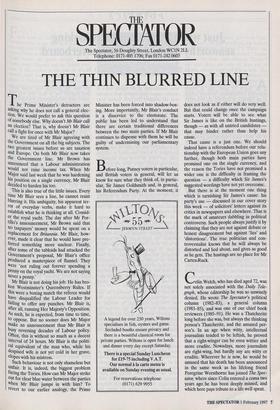SPECTATOR
The Spectator, 56 Doughty Street, London WC1N 2LL Telephone: 0171-405 1706; Fax 0171-242 0603
THE THIN BLURRED LINE
The Prime Minister's ' detractors are asking why he does not call a general elec- tion. We would prefer to ask this question of somebody else. Why doesn't Mr Blair call an election? That is, why doesn't Mr Blair call a fight for once with Mr Major? We are tired of Mr Blair agreeing with the Government on all the big subjects. The two greatest issues before us are taxation and Europe. On both Mr Blair now takes the Government line. Mr Brown has announced that a Labour administration would not raise income tax. When Mr Major said last week that he was hardening his position on a single currency, Mr Blair decided to harden his too.
This is also true of the little issues. Every time Mr Blair sees a line, he cannot resist blurring it. His ambiguity, his apparent ter- ror of everyday verbs, make it hard to establish what he is thinking at all. Consid- er the royal yacht. The day after Mr Por- tillo's announcement, Mr Brown said that no taxpayers' money would be spent on a replacement for Britannia. Mr Blair, how- ever, made it clear that he would have pre- ferred something more unclear. Finally, after some of the tabloids had attacked the Government's proposal, Mr Blair's office produced a masterpiece of flannel. They were 'not ruling out forever spending a Penny on the royal yacht. We are not saying never a penny.' Mr Blair is not doing his job. He has bro- ken Westminster's Queensberry Rules. If this were a boxing match the referee would have disqualified the Labour Leader for failing to offer any punches. Mr Blair is, after all, running Her Majesty's Opposition. As such, he is expected, from time to time, to oppose. But no sooner does Mr Major make an announcement than Mr Blair is busy reversing decades of Labour policy. Often, this is without so much as a decent interval of 24 hours. Mr Blair is the politi- cal equivalent of the man who, while his despised wife is not yet cold in her grave, elopes with his mistress.
Such behaviour is not only shameless but unfair. It is, indeed, the biggest problem facing the Tories. How can Mr Major strike out for clear blue water between the parties when Mr Blair jumps in with him? To revert to our earlier analogy, the Prime Minister has been forced into shadow-box- ing. More importantly, Mr Blair's conduct is a disservice to the electorate. The public has been led to understand that there are certain traditional differences between the two main parties. If Mr Blair continues to dispense with them he will be guilty of undermining our parliamentary system.
Before long, Putney voters in particular, and British voters in general, will let us know for sure what they think of, in partic- ular, Sir James Goldsmith and, in general, his Referendum Party. At the moment, it does not look as if either will do very well. But that could change once the campaign starts. Voters will be able to see what Sir James is like on the British hustings, though — as with all untried candidates that may hinder rather than help his cause.
That cause is a just one. We should indeed have a referendum before our rela- tionship with the European Union goes any further, though both main parties have promised one on the single currency, and the reason the Tories have not promised a wider one is the difficulty in framing the question — a difficulty which Sir James's suggested wordings have not yet overcome. But there is at the moment one thing which is tarnishing Sir James's cause: his party's use — discussed in our cover story this week — of solicitors' letters against its critics in newspapers and elsewhere. That is the mark of amateurs dabbling in political controversy. Such people always justify it by claiming that they are not against debate or honest disagreement but against 'lies' and `distortions'. The true politician and con- troversialist knows that he will always be distorted and lied about, and gives as good as he gets. The hustings are no place for Mr Carter-Ruck.
Colin Welch, who has died aged 72, was not solely associated with the Daily Tele- graph, whose editorship he was so unwisely denied. He wrote The Spectator's political column (1982-83), a general column (1983-85), and was one of our chief book reviewers (1985-91). He was a Thatcherite long before she was, but always the thinking person's Thatcherite, and the amused per- son's. In an age when witty, intellectual journalists tended to be leftish, he proved that a right-winger can be even wittier and more erudite. Nowadays, more journalists are right-wing, but hardly any are witty or erudite. Wherever he is now, he would be amused that his death has been announced in the same week as his lifelong friend Peregrine Worsthome has joined The Spec- tator, where since Colin entered a coma two years ago. he has been deeply missed, and which here pays tribute to a life well spent.


























































 Previous page
Previous page